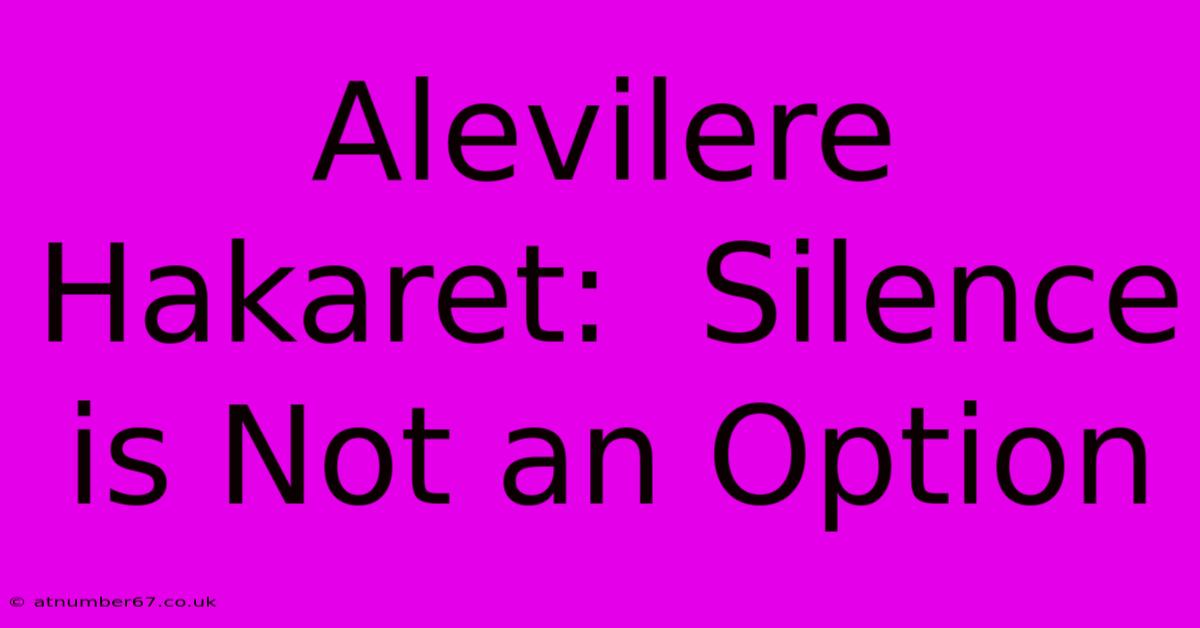Alevilere Hakaret: Silence Is Not An Option

Table of Contents
Alevilere Hakaret: Silence is Not an Option
Alevi communities in Turkey and across the diaspora have long faced discrimination and hate speech. The targeting of Alevis, a diverse group within the broader Shia Muslim tradition, is unacceptable and demands a strong and unified response. Silence, in the face of such bigotry, only emboldens perpetrators and normalizes hateful ideologies. This article will explore the pervasive nature of anti-Alevi sentiment, examine its consequences, and propose strategies for combating this insidious form of prejudice.
Understanding the Roots of Anti-Alevi Sentiment
The historical and political context is crucial to understanding the persistence of hate speech directed towards Alevis. For centuries, Alevis have faced systematic marginalization, often portrayed as deviants or heretics within a predominantly Sunni Muslim society. This historical prejudice has been manipulated and exploited by various political actors to consolidate power and divide the population.
Factors Contributing to the Problem:
- Religious Differences: Misunderstanding and misrepresentation of Alevi beliefs and practices contribute significantly to the prejudice. The unique Alevi faith, with its emphasis on mystical experiences and a different interpretation of Islamic tenets, is often misconstrued and demonized.
- Political Manipulation: Political opportunism has historically fueled anti-Alevi sentiment. Politicians have used prejudiced rhetoric to mobilize support and deflect attention from critical issues.
- Social Stereotyping: Negative stereotypes contribute to the dehumanization of Alevis, making it easier to justify discrimination and hate speech. These harmful stereotypes are often perpetuated through media representation and societal biases.
- Lack of Representation: Insufficient representation of Alevi voices in media and political institutions further marginalizes the community and amplifies existing prejudices.
The Consequences of Anti-Alevi Hate Speech
The impact of hate speech extends beyond mere words. It creates a climate of fear and intimidation, contributing to:
- Violence and Discrimination: Verbal attacks often escalate into physical violence and discriminatory practices in employment, housing, and education.
- Social Isolation: The constant threat of prejudice can lead to social isolation and a sense of exclusion within wider society.
- Psychological Trauma: Being subjected to hate speech can have profound psychological consequences, causing anxiety, depression, and trauma.
- Erosion of Social Cohesion: The normalization of hate speech undermines social cohesion and fuels societal divisions.
Combating Anti-Alevi Hate Speech: A Multi-pronged Approach
Combating anti-Alevi hate speech requires a multifaceted approach involving individuals, institutions, and the government:
1. Education and Awareness:
- Promoting accurate information: Education programs should focus on promoting accurate information about Alevi beliefs and culture, countering misinformation and harmful stereotypes.
- Interfaith Dialogue: Encouraging interfaith dialogue and understanding can help bridge the gap between communities and foster mutual respect.
2. Legal and Institutional Reforms:
- Strengthening hate speech laws: Governments need to strengthen laws against hate speech and ensure their effective enforcement.
- Promoting inclusion: Institutions should actively promote the inclusion of Alevis in all aspects of society, ensuring equal opportunities in employment, education, and political representation.
3. Media Responsibility:
- Responsible reporting: Media outlets have a responsibility to report on issues affecting Alevis fairly and accurately, avoiding language that reinforces negative stereotypes.
- Counter-narratives: Amplifying the voices of Alevis and creating counter-narratives to combat prejudice is crucial.
4. Individual Action:
- Challenging hate speech: Individuals have a responsibility to challenge hate speech whenever they encounter it.
- Building alliances: Forming alliances with other groups facing discrimination can create a stronger collective voice against prejudice.
Silence is not an option. We must all actively participate in creating a society where Alevis and all minority groups can live without fear of discrimination and hate speech. This requires a sustained commitment to education, legal reforms, media responsibility, and individual action. Only through collective effort can we build a truly inclusive and equitable society.

Thank you for visiting our website wich cover about Alevilere Hakaret: Silence Is Not An Option. We hope the information provided has been useful to you. Feel free to contact us if you have any questions or need further assistance. See you next time and dont miss to bookmark.
Featured Posts
-
Ddgs Net Worth Building A Legacy
Apr 02, 2025
-
Daughter Meaning In Bengali From Tradition To Today
Apr 02, 2025
-
Nkosazana Daughter Breaking Barriers
Apr 02, 2025
-
Bccis Net Worth A Comprehensive Report
Apr 02, 2025
-
Ilan Tobianahs Financial Power The Facts
Apr 02, 2025
